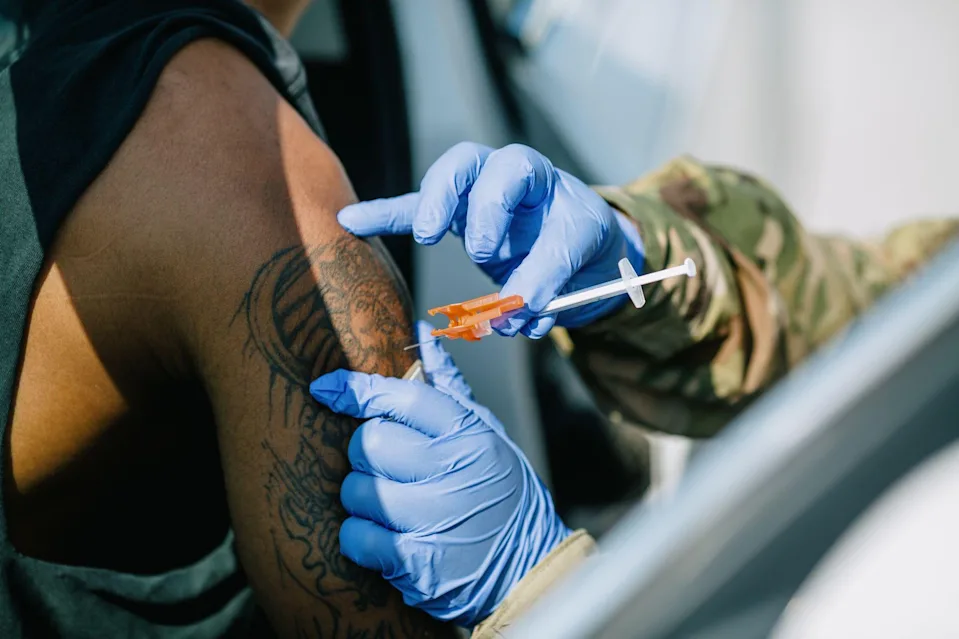A New York healthcare worker who was just fired for refusing the COVID-19 shot says she wouldn’t get it even if God said ‘you must take this vaccine’
By Katie Balevic
10/05/2021

Courtesy of Karen Roses.
- Karen Roses of Riverhead, New York was fired from a Northwell Health hospital for refusing to take the coronavirus vaccine.
- New York’s COVID-19 vaccination mandate went into effect on September 27, requiring hospital and nursing home healthcare workers to have received their first dose.
- Roses is one of a fraction of healthcare employees who would rather be terminated than get the COVID-19 vaccine.
Karen Roses worked at Peconic Bay Medical Center in Riverhead, New York for over three years as a patient care technician. She said the pandemic has been exhausting, leaving medical personnel burnt out and hospitals understaffed. Then came the vaccination mandate.
“They come out with the mandate, and they just basically threw us under the bus.,” Roses, 64, said about healthcare workers. She called the hospital “callous” for terminating employees while disregarding how long they had been employed with the hospital or whether they were seeking medical or religious exemptions to the vaccine.
According to the state mandate that went into effect in August, New York hospital and nursing home healthcare workers were required to have received their first COVID-19 vaccine dose by September 27, while home care, hospice, and adult care facility workers have until October 7. Roses was terminated the day after the vaccine deadline.
Roses said unvaccinated healthcare workers are being singled out and blamed for the ongoing pandemic, despite early suggestions that vaccinated people can spread the coronavirus as well. However, a recent study found that COVID-19 vaccines considerably reduce transmission of the virus by anywhere from 36 to 65%, NBC News reported.
In Suffolk County, where Peconic Bay Medical Center is located, 80% of hospital employees are fully vaccinated, according to September 29 data. Statewide, 87% of hospital employees are fully vaccinated. As a result of the mandate, the vaccination rate of hospital employees has doubled compared to the rate of adults in the state.
“It’s not just healthcare workers. It’s everybody,” Roses said.
Roses said vaccination mandates — which have rolled out nationally for healthcare facilities and businesses — are “taking away a freedom of choice” from the people affected by them. Roses added that she is not anti-vaccine and has taken other vaccines in the past.
“I don’t feel safe in my own country anymore, and that’s really what I think is my strongest feeling,” Roses said. “Now I feel like a target.”
As Insider’s Allana Akhtar previously reported, some health systems have blamed unvaccinated healthcare workers for staffing shortages, but the problem with unvaccinated healthcare workers may be overstated.
Roses said she won’t get the vaccine because it feels “rushed” and “forced,” and it doesn’t guarantee that she won’t get coronavirus or spread it to others. Experts have said the vaccine was developed quickly because countries and organizations heavily invested in its development, which saved time, as Insider’s Mary Meisenzahl previously reported.
“God could come down and say to me, ‘You must take this vaccine.’ And I’d be like, ‘Sorry, Charlie,'” Roses said. “It’s not something that somebody specifically or a specific group has to tell me it’s safe. My research has to tell me it’s safe. The people that I talk to… I don’t know how to really explain that, but I kind of have to see it for myself.”
In her termination letter, which has been shared with Insider, Northwell Health, New York’s largest healthcare provider which owns Peconic Bay Medical Center, stated that Roses was warned “numerous times” about the requirement for her to be vaccinated or face termination. The letter added that if she received her first dose in the “near future,” she would be eligible for reemployment at the hospital.
A spokesperson for Peconic Bay, a Northwell Health facility, told Insider that Northwell has taken “a rapid, aggressive approach” in moving towards full vaccination of its employees.
“Regretfully, we have had to exit a few hundred employees, but we are pleased to report that most team members are opting to be vaccinated so as to avoid being terminated,” Peconic Bay spokesperson Victoria Palacio said, adding that she could not comment on how many employees were terminated from Peconic Bay specifically.
Northwell Health spokesperson Andrea Mineo told Insider that as of September 27, unvaccinated employees were removed from the health system.
“Northwell regrets losing any employee under such circumstances, but as health care professionals and members of the largest health care provider in the state, we understand our unique responsibility to protect the health of our patients and each other,” Mineo said. “We owe it to our staff, our patients and the communities we serve to be 100 percent vaccinated against COVID-19.”
Events…
预告一周北美法律公益讲座安排
10/04/2021
时间:周二到周五 晚间
5:30-7:00(西部时间)8:30-9:30(东部 时间)
重播:第二天
上午9:00(西部时间)
中午:12:00(东部时间)
周二: 蒋律师讲遗嘱和需要注意的问题
周三: 数据泄露和个人身份保护&事业机会说明会
周四:北美常见法律问题案例分享(主讲:Joanna,Irene)
周五:律师讲人身伤害如何索赔
Zoom 6045004698
密码:请扫码进群索取
另外:周三6:30(西部时间)美国专场(Michael Wang 主讲)
Zoom 95190929213
密码请扫码进群索取。

Get Shots or Get Out, U.S. Employers Are Telling Workers
By Jonathan Levin, Skylar Woodhouse and Kara Wetzel

(Bloomberg) — Vaccine mandates are beginning a march across the U.S., constricting the places that people who have shunned the shots can work, shop and play.
A day after the federal Food and Drug Administration approved the Pfizer BioNTech vaccine, institutions central to their regions announced tougher — perhaps bellwether — rules. In New York, a city driven by finance, Goldman Sachs Group Inc. required bankers to prove they’d been vaccinated. In football-crazed Baton Rouge, Louisiana State University will demand vaccines or negative Covid tests to see a game at Tiger Stadium, capacity 102,000.
CVS Health Corp. this week mandated shots for corporate employees and those working with patients, while Chevron Corp. and Hess Corp. added requirements for employees on oil platforms in the Gulf of Mexico. Walt Disney Co. announced a deal with its roughly 40,000 unionized theme-park workers in Florida. Delta Air Lines Inc. said Wednesday that it would levy a monthly $200 charge on workers who refuse to protect themselves.
Delta’s announcement came a week after Deutsche Bank AG told employees that they would only be allowed onto its U.S. trading floors if they were fully vaccinated.
Such stringent requirements had been relatively rare in the U.S., as companies and politicians tried to avoid angering a significant segment of the population hostile to vaccines and other health measures. But President Joe Biden this week encouraged public and private sector employers to crack down. The FDA approval emboldened them to demand that workers and consumers get shots or get out.

Tel: 551-580-4856 | Email: F.WINNIE.S@GMAIL.COM
In government, 19 states, plus the nation’s capital and Puerto Rico, are already requiring at least some workers to be vaccinated or undergo regular testing. Ohio State University said Tuesday that faculty, staff members and all of its almost 60,000 students must be vaccinated by Oct. 15.
Sandra Crouse Quinn, a professor in the University of Maryland’s School of Public Health, said she expected an “avalanche” of similar moves among public and private institutions. “Companies and universities believe that they have a stronger leg to stand on to mandate vaccines,” she said.
The U.S. is reaching a critical juncture, with the emergence of the highly infectious delta variant and more than 100 million eligible residents still not fully vaccinated. Alarming surges of hospitalizations in Florida and the Deep South have dispelled any lingering perception that current levels of immunity were enough to emerge from the pandemic.
Gerald Harmon, head of the American Medical Association, said society’s fight against Covid could drag on for years: “The way to regain the upper hand in this fight is requiring vaccinations — specifically vaccine mandates,” he said.
Disney, the world’s largest entertainment company, said last month that it would require vaccinations for all nonunion employees coming to the office or working at its parks. The company continues to negotiate with its other unions. In a statement, Disney said the vaccine is the “best way to protect each other.”
“Disney is not foolish,” said Quinn, the Maryland professor. “They need to make sure they have a healthy workforce so they can maintain their business.”
Even before the FDA announcement, many companies had begun stepping up their requirements, at least in major offices. Companies including Facebook Inc., McDonald’s Corp. and Citigroup Inc. instituted vaccine mandates for office workers. Walmart Inc., the largest private employer in the U.S., is requiring headquarters and regional staff to get shots by Oct. 4.

Many retail and restaurant employees who interact with customers still don’t have to get a shot. The differing restrictions for separate classes of workers lead to working conditions reminiscent of pandemic’s harrowing early days — white-collar employees enjoying a more comfortable, controlled environment while blue-collar colleagues labor where they’re more vulnerable to infection.
Some companies are seeking a middle ground to avoid weakening morale or prompting staff defections amid a tough hiring climate. Options being explored include surcharges on health-care premiums, as some companies already do for smokers, or denying free coffee, fitness rooms or other perks to the unvaccinated, according to human-resources consultants.
The companies confront stubborn resistance. A KFF Covid-19 Vaccine Monitor survey of 1,517 U.S. adults taken July 15-27 showed about 10% of Americans were still in “wait and see” mode on the vaccine. Another 3% would only get it if required, while 14% would not get it under any circumstances. About 20% of Republicans completely reject the vaccines, versus about 5% of Democrats.
The opposition has been enabled by social media misinformation, conservative television and GOP politicians, who were loath to lose the antivaccination parts of their base. This weekend, even former President Donald Trump was booed during an Alabama rally when he advised attendees to get their shots. He swiftly pivoted to talking about citizens’ rights.
With the more-infectious delta variant circulating, the U.S. needs aggressive policies on vaccines to ensure the country doesn’t have to return to lockdown policies, said Danielle Ompad, associate professor of epidemiology at New York University’s School of Global Public Health. “In order for us to stay open, we really need cooperation,“ Ompad said.
Speaking Monday after the Pfizer approval, Biden said he hoped the FDA’s move would ease vaccine hesitancy and give companies the confidence to act. He noted that many Americans had used the lack of full FDA approval as a reason to avoid the vaccine. For them, he said, “the moment you’ve been waiting for” has arrived.
Mandates are a crucial tool to making the nation and its economy function again, Labor Secretary Marty Walsh said in an interview last week.
“We have to do everything we can that’s within our control to keep people safe,” Walsh said. “And what’s in our control today is masks, is physical distancing, is washing hands, is getting vaccinated. We know: The science has told us that works.”
In-Depth: Vaccine mandates, businesses, and the law
By Tim Kephart
8/26/2021
TAMPA, Fla. — As businesses like Delta Airlines and governments like the City of Tampa begin to implement strong vaccine mandates, questions surrounding those mandates continue to be asked including the legality of such a measure.
Are vaccine mandates legal?
It depends on who is issuing the mandate. The federal government has never issued a nationwide vaccine mandate, according to Scientific American. Instead, the decision-making has been largely left to the states. And according to the United States Supreme Court, yes.
The Supreme Court’s main ruling on vaccine mandates came in 1905, though the court also declined to hear a case recently on the subject. In 1905, the Supreme Court heard the case of Jacobson vs Commonwealth of Massachusetts. The case surrounded a Massachusetts law that allowed cities to impose smallpox vaccine mandates. Jacobson sued after being fined for breaking the law. The Court, in a 7-2 decision, said the Massachusetts law was Constitutional and added it “is within the police power of a State to enact a compulsory vaccination law” and for the legislature to determine if vaccination is the best mode to prevent smallpox “and the protection of the public health.” The Court later said in Zucht vs. King, 1922, that the Jacobson case and others had settled the question of whether a state, consistent with the U.S. Constitution, may “delegate to a municipality authority to determine under what conditions health regulations shall become operative.”
The most recent case coming before the Supreme Court on vaccine mandates was on August 12. Justice Amy Coney Barret declined a request from eight students at Indiana University who sued over the school’s policy that students must be vaccinated. Justice Barrett turned down the request for emergency relief without comment and did so without referring the matter to the full court. The students lost at every level of court in their push to overturn IU’s mandate. One of the appeals court judges relied on the decision in Jacobson in his opinion, according to the New York Times.
Can businesses implement vaccine mandates?
Businesses have wide leeway to enact vaccine mandates. Both the Department of Justice and the Equal Employment Opportunity Commission have weighed in on the subject this year and said businesses can require employees to get vaccinated, with some exceptions.
Specifically, the Justice Department said Section 564 of the Food, Drug, and Cosmetic Act does not prevent businesses from implementing vaccine mandates, even when the vaccine is under Emergency Use Authorization from the Food and Drug Administration. At the time of the Justice Department’s opinion, all three COVID-19 vaccines were under EUA. However, this week, the Pfizer vaccine was given full authorization by the FDA.
The EEOC said federal equal employment opportunity laws “do not prevent an employer from requiring all employees physically entering the workplace to be vaccinated for COVID-19, subject to the reasonable accommodation provisions of Title IVV and the ADA and other EEO considerations.” The EEOC did say numerous exceptions can apply to any vaccine mandate from an employer, along with other restrictions listed by the EEOC in the guidance on its site.
“There is a limited exception for that very small universe of people who have health conditions where the vaccine is not appropriate. In those instances there may be reasonable accommodations available,” said Ryan Barack, a Board Certified Labor and Employment Lawyer.
It should be noted that collective bargaining agreements can play a role in the application of vaccine mandates. CBAs may limit some vaccine mandates, but according to CNN, “those don’t stop employers from implementing vaccine mandates on new or non-unionized employees.” This played out in real-time on Wednesday as the city of Tampa said it would have to negotiate the new vaccine mandate in the city with the police, fire, and other unions in the city.
What about Florida and vaccine mandates in the state?
As noted above, states have leeway from the Supreme Court to implement vaccine mandates. The state of Florida already mandates many vaccines in school-age children, though some exceptions do apply even in those circumstances. While six states have enacted bans on COVID-19 vaccine mandates for employers and schools, Florida is not one of them. Florida does have a ban on COVID-19 vaccine mandates for schools.
Governor Ron DeSantis has repeatedly said he would not be imposing restrictions on businesses from implementing policies, including mask or vaccine mandates, they see fit. Many private businesses across the country have announced vaccine mandates including Google, Netflix, Morgan Staley, and others.
“In terms of an employment context, that’s a totally different thinkg than a vaccine passport,” DeSantis said during a press conference in May 2021. “I don’t support mandates either way for employers with that but that’s a separate thing. There’s a lot of body of law with that.”
Does HIPAA prevent my employer from legally being able to ask me for vaccine proof?
“HIPAA has no applicability on this at all. Employers can require proof of vaccination, and HIPAA has nothing to do with it,” said Barack.
He adds if a business plans to keep those vaccination documents on file, they should treat them the same way they treat other confidential health information. He says that might mean placing that information in a separate file but that doesn’t mean an employer can’t ask for it and keep it.
Can sub-contractors be mandated?
Yes. Companies can require that sub contractors have their representatives be vaccinated. The requirement for having people being vaccinated is not dependent on an employee/employer relationship.
“Just because someone is a sub contractor, as part of the sub contractor relationship, you can require that the subcontractors be vaccinated” said Barack.
Are there alternatives to mandates?
Some businesses are using incentives or penalties to try and increase their vaccination rates. Delta Airlines was the latest to announce such a policy Wednesday when the company said it would add a $200 monthly surcharge to employee’s insurance costs if they remain unvaccinated. This has been done at a local level of government too with states and cities offering cash incentives or holding drawings for larger prizes when people get vaccinated. Governor DeSantis has repeatedly said he would not offer any incentives for vaccination in Florida.
What about “vaccine passports?”
While Florida doesn’t limit businesses from mandating vaccines for their employees, the state does ban businesses from asking for proof of vaccination from customers. This has been enacted in other states as well and earned proof of vaccination the moniker of “vaccine passports.” Florida’s ban on proof of vaccination is currently on hold while a legal battle over them is fought between the state and Royal Caribbean Cruise Lines. Until the courts render a final verdict on “vaccine passports,” the issue remains in question.
Are there any legal challenges remaining to vaccine mandates?
The largest recent challenge to COVID-19 vaccine mandates has come from Texas. Houston Methodist Hospital introduced a COVID-19 vaccine mandate for employees. A group of more than 50 employees refused to get the COVID-19 vaccine and were subsequently terminated. The group filed suit and lost at the district court level. The case remains active on appeal.






